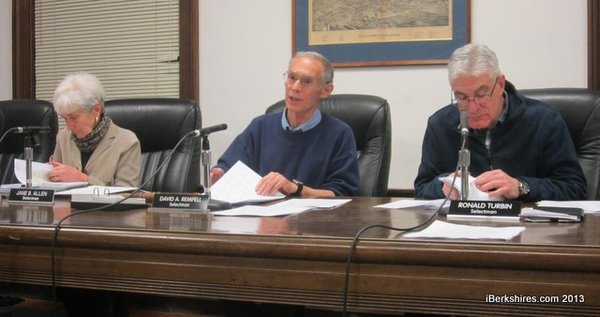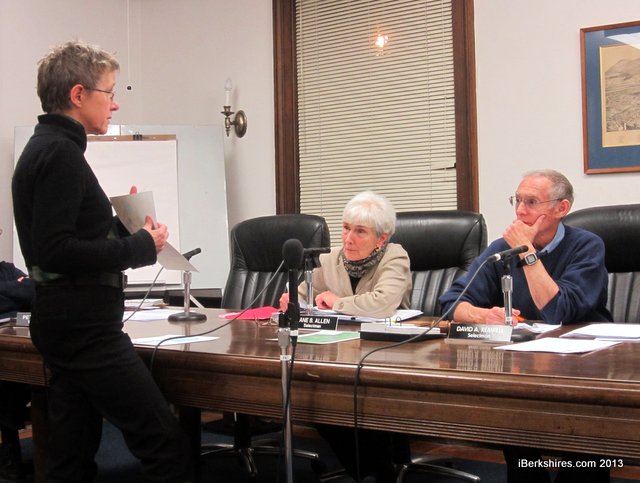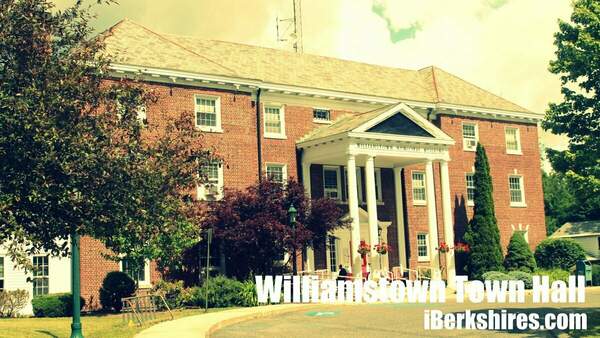
Williamstown Moves Date of Town Election
|
Planning Board Chairwoman Ann McCallum explained some of the zoning changes her board is recommending. |
WILLIAMSTOWN, Mass. — The Selectmen decided on Monday night to change the town election to bring it in line with the statewide special primary election to fill the U.S. Senate seat formerly held by Secretary of State John Kerry.
The town election now will be held Tuesday, April 30, from 7 a.m. to 8 p.m. at Williamstown Elementary School, a full three weeks ahead of town meeting, which will remain on Tuesday, May 21, at 7 p.m. at the school.
The earlier than planned date of the town election changes two pre-election deadlines: the deadline to file nomination papers for certfication by the town clerk and Board of Registrars is Thursday, March 21, at 5 p.m. The deadline to register to vote in the April 30 balloting is Wednesday, April 10, at 8 p.m.
A town election date of May 14 was approved by the Selectmen in December, but at its Feb. 11 meeting, the panel gave the go-ahead for the town manager and clerk to create a proposal for an altered schedule. Lee and Lenox have also moved their local elections to align with primary.
At Tuesday's meeting, the three board members in attendance ratified the new schedule unanimously. Selectman Ronald Turbin remarked that by combining the town vote with the state special election, the town stands to save $2,000.
Williamstown gets a jump start on the election season Tuesday night — in manner of speaking.
A special town meeting will be held at 7 p.m. at Town Hall to see if the town will remove two outdated deed restrictions on properties previously sold by the town to private entities.
One, the former home of the Williamstown Youth Center on Cole Avenue, has a 1966 restriction returning the former school building to the town unless the building continues to be used as a recreation center.
Town Manager Peter Fohlin explained that the WYC, which has a new home on the elementary school grounds, has a buyer in place for the Cole Avenue property, but the prospective buyer would like the restriction lifted before the sale can go forward.
After the meeting, Chairman David Rempell, who is executive director of the Youth Center, said he was not at liberty to identify the prospective buyer, on the advice of his real estate agent.
The other deed restriction on tonight's warrant involves land near the Department of Public Works property on Simonds Road that the town sold to Purple Moon LLC in 2003. Purple Moon, known better as Countryside Landscaping, bought the property on the condition that it would establish a nursery on the site, Fohlin said.
"If Countryside didn't do what it proposed ... we would have the right to take the property back because we didn't want to see it 'flipped,' or there was always the possibility [Countryside] could run into financial difficulties and not be able to complete the project," Fohlin said. "Neither of those things happened. Countryside is a success and continues to flourish."
Fohlin said he did not know why Purple Moon asked to have the deed restriction lifted, but he speculated one possible reason could be that the company wanted to refinance a loan. Or it could be a simple matter of the owners wanting to tie up a loose end.
"It could be they want [the restriction] cleaned up while the people who remember why it was put in place are still alive," Fohlin said. "These are difficult things to clean up 40 years later."
The Selectmen also heard a recommendation from the Planning Board to make several modifications to the town's Zoning Act.
The planners recommend expanding the Planned Business district on Main Street to include the former Grand Union building and Chopsticks restaurant. The change will allow more permissable uses on the sites, Planning Board Chairwoman Ann McCallum explained.
The planners also recommend eliminating the Tourist Business District designation that is used along areas of Route 7 on North Street and Cold Spring Road.
In the former area, the parcels currently covered by the Tourist Business designation would be chnaged to Limited Business, a move favored by business owners in the district.
In the latter, the area along Cold Spring Road from the junction with Route 2 north to about Bee Hill Road would be given a new designation: the Southern Gateway Zone.
"We propose to combine the more permissive aspects of Rural Residence 3 and the Tourist Business Zone," McCallum said. "This will allow single family housing or two-family housing."
McCallum said the planners hope the change will allow people to fill some of the vacant buildings on that stretch of Route 7.
The Planning Board also is recommending that bed and breakfast operations be allowed in rural zones where they currently are not permitted. And it seeks to eliminate the General Residence District 2 designation, which has been made functionally indistinguishable from General Residence District 1 because of amendments made since the two districts were created.
In other business on Monday, the board approved a change in the alcohol license of the Orchards hotel, which has undergone a change in its ownership structure, and changed the name of the liquor manager on the license to that of Bernard English, who has been general manager of the hotel for almost four years.
Tags: commercial zoning, primary, town elections, zoning,
















